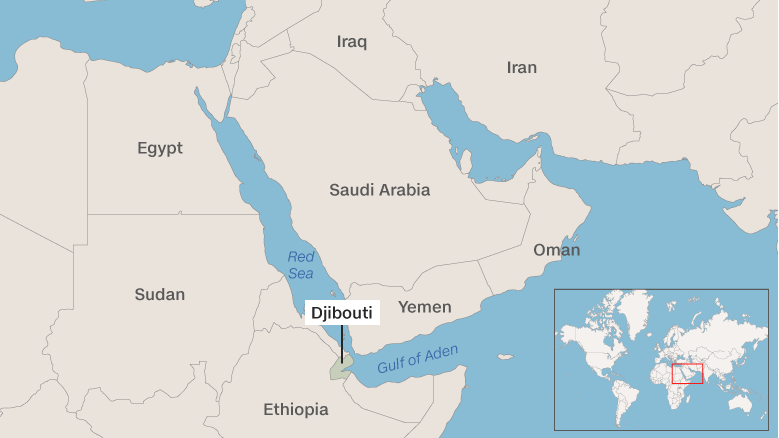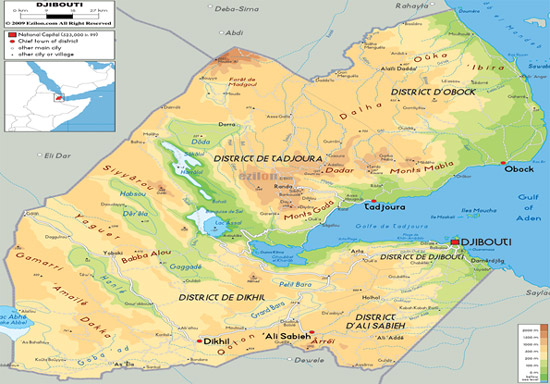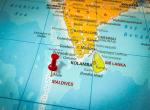Introduction
In the recent years, as part of national defense policy, China has expanded its military ties across the African continent. On 11 July, 2017, two Chinese Navy warships left the port of Zhanjiang with military personnel on the journey across the Indian Ocean. China dispatched its troops to a small country in East Africa, Djibouti, for establishment of its first overseas military base which was formally opened on August 1, 2017. There are around 2,500 Chinese combat-ready soldiers and police officers deployed in United Nation Peacekeeping missions in Africa, with the largest one in South Sudan. Since 2008, China is also among Africa's main trading partners as the country is interested in securing a long-term foothold on the continent.
Djibouti is at the core of such a strategy as it is positioned on the northwest edge of the Indian Ocean. The establishment of naval base here represents the "first pearl of a necklace" unfolding along the sea route that connects China to West Asia. This would in many ways help China realise its ambitious plan of a Maritime Silk Road (MSR). The MSR is a vast international network of sea infrastructure which aims at securing its trade routes, ensuring the undisturbed travel of China-bound raw materials and energy vessels, as well as of its transformed products back to Europe through the Gulf of Aden. Africa is home to an estimated one million Chinese nationals, with many employed in infrastructure projects backed by the Chinese government. China's involvement in African security is a product of a wider transformation of China's national defense policy.
Djibouti – A Strategic Outpost
Djibouti which was colonized by the French, today is home to less than one million people. The country is small both in size and population but its position on the tip of Horn of Africa is such that it offers strategic access to the Bab el-Mandeb Strait. This strait connects the Mediterranean Sea via the Suez Canal and the Red Sea to the Gulf of Aden and the Indian Ocean beyond marking itself as the world's most important sea lanes where millions of barrels of oil and petroleum products pass through the strait on a daily basis (Brad Lendon and Steve George, 2017). Djibouti also lies at the junction of three highly troubled regions which are: i) the Arabian Peninsula particularly Yemen; ii) the Horn of Africa which includes Somalia, Eritrea; and iii) Egypt and Sudan in North Africa. Djibouti has played host to the United States (US), French and Japanese defence forces for more than a decade. In fact, the country has been an active base in the US war against terror, particularly for drone strikes in Somalia and Yemen (Brig. Mandeep Singh, 2016). In the year 2007, the US had set up Camp Lemonnier in Djibouti with its 88 acre facility. This has now grown to 500 acres, with an air base, drone base and almost 4,000 troops that are stationed to ensure the US interests in Africa, and at the same time the Arabian Peninsula, are taken care of.

Djibouti is ruled by President Guelleh, who has had a strong grip on government for years, thus ensuring political stability. At the same time, the international military presence in such a troubled and disturbed region of Djibouti provides security to the country too. The President, in 2014, renewed the lease of the base to the US for 10 years with a provision of extending it for another 10 years. But his decision came at a price. The lease was extended at an annual payment of USD 70 million, up from 30 million earlier, more than doubling the rentals, reflecting the “base’s expanded operations” (Eric Schmitt, 2015). However, what took the US by surprise was Guelleh’s decision that permitted the Chinese to set up a base soon after the visit of John Kerry to Djibouti. This was indeed a clear indication of the growing Chinese influence in the region. China Merchant Holdings (International), the port operations division of its mainland behemoth, China Merchants Group, acquired a 23.5 per cent stake in Port de Djibouti for USD 185 million, which includes two-thirds of the port's Doraleh Container Terminal. The Doraleh Container Terminal, with its 18-metre draft and 1,050-metre quay, can handle three million TEU (twenty foot equivalent unit) of cargo capacity a year, which is perhaps the most advanced in East Africa. In a statement, the company said, "Djibouti, which lies at the mouth of Red Sea makes it an ideal transhipment hub for cargo in and out of East Africa, and offers long-term growth potential as the economic momentum in the proximity intensifies over time (Brig. Mandeep Singh, 2016).

Obock (in the figure above) which is a small fishing village to the North of the Gulf of Tadjoura is the area offered by Djibouti to China for military support facility. Like the Djibouti Port, which has a draft of 18 metres and can berth large warships, it is possible to create a similar capacity in Obock with the proven capability of Chinese marine engineers as witnessed in the South China Sea. Obock is separated from the rest of Djibouti by mountains to its West and a rising but relatively flat plateau to its North. The flat plateau affords construction of an airstrip and establishment of a base. Moreover, Obock is away from the US, French and Japanese military bases, providing the PLA Navy (PLAN) exclusivity and independent access.
China – Djibouti Relations
Diplomatic relations between China and Djibouti was established in 1979 but the relationship intensified after 2002, when the bilateral trade volume stood at USD 49.83 million. Earlier, Djibouti was not seen as an important country for China’s overall economic penetration of Africa. It was the country’s strategic location that gained prominence and China looked at Djibouti as a logistics base for its flotilla providing security to Chinese merchant shipping from pirates in the Horn of Africa and in the Gulf of Aden. Also, its military potential was realised only when China evacuated its nationals from Yemen in April 2015 by ship and air via Djibouti (Brig. Mandeep Singh, 2016). On 22 November 2015, the 756 kilometre Ethiopia-Djibouti rail project was constructed by two Chinese companies, i.e. China Railway Group (CREC) and China Civil Engineering Construction Corporation (CCECC). China and Djibouti signed a Defence and Security Agreement in the year 2014, which further paved the way for the establishment of China’s permanent military presence in Djibouti. Under this agreement, Djibouti offered the use of its port for the People’s Liberation Army (PLA) and in exchange Djibouti had asked for military co-operation to be expanded in order that the operational capacities of the Djiboutian armed forces could be built up in order to safeguard security in the country and help consolidate peace and security in the sub-region. The agreement was signed by the Djibouti Defence Minister, Hassan Darar Houffaneh with the Chinese Minister of National Defence General Chang Wanquan. Djibouti also asked for patrol boats, airplanes and training in the PLA’s colleges in the maritime, armaments, logistics and engineering sectors (Jeremy Binnie, 2015).
China’s first permanent overseas military deployment in Djibouti is the latest step in the Asian nation’s increasingly assertive foreign policy. While Chinese troops have participated in UN peacekeeping assignments and rescue missions to Libya and Yemen, the new base in Djibouti marks the first time a long-term garrison of the People’s Liberation Army has been established beyond China’s borders since their withdrawal from North Korea in 1958. This also symbolises a bolder foreign policy under President Xi Jinping (Financial Times, 2017). China signed an initial 10-year lease for the base and will pay $ 20 million per year in rent. It started building the base, which is the country's first naval base abroad, last year and it will be stationed just a few miles from Camp Lemonnier, the only permanent US base in Africa since 2002. Djibouti also hosts troops from France and Japan. The US pays $ 63 million a year to lease Camp Lemonnier (First Post, 2017). China seeks to gain access to natural resources and open new markets and therefore, it has made extensive infrastructure investments throughout the African continent.
Conclusion
China’s economic penetration of Africa and Latin America, coupled with its growing status in international affairs, has necessitated that its interests be safeguarded by its own military. President Xi Jinping’s ‘One Belt, One Road’ initiative, particularly the Maritime Silk Road component, is an ambitious plan to connect China to Europe and Africa through land and sea. Ostensibly an economic initiative, it has an inherent military component – the protection of extended sea lanes, for which China needs overseas bases from where its Navy could operate in the Indian Ocean Region. The acquisition of the base in Djibouti - whether for replenishment of its anti-piracy fleet operating off the coast of Africa or for deployment of its air and naval assets to conduct non-combatant evacuation operations - represents a strategic shift in its foreign policy. There are other reasons too. As China aspires to become a global power and challenges the existing world order, permanent bases overseas hosting warships and long range strategic aircraft lend muscle to China’s diplomacy.
Acquisition of this base signals China’s arrival on the global stage as a power capable of guarding its interests worldwide.
Endnotes:
• Brig. Mandip Singh 2016, “Port de Djibouti: China’s First Permanent Naval Base in the Indian Ocean”. Senior Fellow at the Institute for Defence Studies and Analyses. New Delhi.
• Brad Lendon and Steve George (2017), “China sends troops to Djibouti, establishes first overseas military base” by,CNN.http://edition.cnn.com/2017/07/12/asia/china-djibouti-military base/index.htmlhttp://edition.cnn.com/2017/07/12/asia/china-djibouti-military-base/index.html
• Charlotte Gao (2017), ‘The Diplomat’, July 12, 2017. http://thediplomat.com/2017/07/china-officially-sets-up-its-first-overseas-base-in-djibouti/
• “China Merchants Buys Control of Djibouti’s Red Sea Container Terminal,” Infinity Cargo Express Limited (accessed on 5 December 2015).
• “Djibouti-China Bilateral Relations”, Embassy of Djibouti in China. According to this overview of bilateral relations, “China has provided economic assistance to Djibouti since 1979 and has completed many construction projects such as the People’s Palace, the bronze monument of the Unknown Soldier, the Stadium Hassan Gouled, the Administration Building DFAIT, the new building of the CERD, the Diplomatic Institute, the Institute of Djiboutian Arts, two sports complexes located in Tadjourah and Dikhil, the new hospital of Arta, two rural primary schools located respectively in Holl-Holl and Yoboki, the dialysis room of the Peltier General Hospital, etc.…”. (accessed on 22 November 2015).
• Eric Schmitt, “U.S. Signs New Lease to Keep Strategic Military Installation in the Horn of Africa”, The New York Times, May 5, 2014 (accessed on 5 December 2015)
• Financial Times, 2017 - “Chinese military base takes shape in Djibouti”. https://www.ft.com/content/bcba2820-66e1-11e7-8526-7b38dcaef614
• First Post, 2017: “China sends troops to Djibouti base: Beijing's growing presence in Indian Ocean Region should rattle India, US”. http://www.firstpost.com/india/china-sends-troops-to-djibouti-base-beijings-growing-presence-in-indian-ocean-region-should-rattle-india-us-3807909.html
• Jeremy Binnie, “Djibouti parades Chinese tank destroyer,” IHS Jane's Defence Weekly, 28 June 2015 (accessed on 6 December 2015).
Image Source:
http://media.washtimes.com.s3.amazonaws.com/media/image/2017/07/11/china_djibouti_military_base_94564.jpg











Post new comment